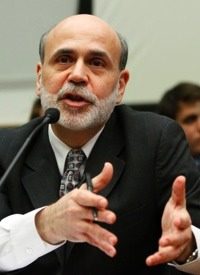
On February 24, Congressman Ron Paul (R-Texas), at a hearing held by the House Financial Services Committee, asked Federal Reserve Chairman Ben Bernanke whether he was aware of allegations that the Federal Reserve had been complicit in the Watergate cover-up and in the illegal funneling of billions of dollars in loans to Iraq’s Saddam Hussein:
“It has been reported in the past that during the 1980s that the Fed actually facilitated a $5.5-billion loan to Saddam Hussein. And he then bought weapons from our military-industrial complex. And also that is when he invested in a nuclear reactor….
“Also there’s been reports that the cash used in the Watergate scandal came through the Federal Reserve. And when investigators back in those years tried to find out, they were always stonewalled, and we couldn’t get the information…. Would you grant that after 10 or 15 years, the American people deserve to know?”
Chairman Bernanke, caught off guard, replied that he found such allegations “absolutely bizarre,” adding that “I have absolutely no knowledge of anything remotely like what you just described. As far as the 10 years, after five years, we produce complete transcripts of every word said in the FOMC meetings. So you have every word in front of you.”
The unexpected exchange caught the momentary attention of the political punditry. Blogs from the Wall Street Journal to NPR made incredulous note of it, while the Huffington Post called Congressman Paul’s allegations “wild accusations.” The consensus among the opinion cartel, to the extent that they deigned to take notice of the episode at all, was that the February 24 sparring was just another irresponsible outburst from Congressman Paul, Capitol Hill’s crazy uncle. Case closed.
Undismayed, Congressman Paul the following day produced documentation for insertion into the Congressional Record to substantiate his allegations of the previous day. His source was none other than Dr. Robert D. Auerbach, a professor at the LBJ School of Public Affairs at the University of Texas and author of Deception and Abuse at the Fed (University of Texas, 2008). Professor Auerbach was also an economist with the House of Representatives Financial Services Committee during the tenures of four Fed Chairmen, from Arthur Burns through Alan Greenspan. Congressman Paul cited a letter he had received from Auerbach thanking him for bringing to light long-neglected facts about the Federal Reserve’s shady past. In his letter, Professor Auerbach rehearsed evidence from his book (some of which was culled from actual minutes of meetings by Fed officials) that the Fed had misled investigators about the source of the $6,300.00 in cash found on the persons of the burglars apprehended at the Watergate break-in. Wrote Auerbach:
“The Federal Reserve under the chairmanship of Author Burns not only kept the Fed from getting entangled in the Watergate coverup, which the Fed’s actions had assisted, it allowed false statements about bills the Fed knew were issued by the Philadelphia Fed Bank to stand uncorrected. Blocking information from the Senate and House Banking Committees … and issuing false information during a perilous government crisis imposed huge costs on the public that had insufficient information to hold the Fed officials accountable for what they had withheld from the Congress. Had the deception been discovered the Fed chairmen following Burns may have been forced to rapidly implement some real transparency to restore the Fed’s credibility. That would have reduced or eliminated many of the lies, deceptions, and corrupt practices that are described in my book.”
Professor Auerbach went on to discuss the shady dealings of one Christopher Drogoul, the manager of the Atlanta branch of the Banca Nazionale del Lavoro (BNL), who, beginning in 1986, became the middleman for a scheme to funnel billions of dollars to Saddam Hussein to support his war against Iran. The loans, supposedly authorized by the U.S. Department of Agriculture and guaranteed by the U.S. government, were of very dubious merit, since Iraq was not deemed credit-worthy. Yet Federal Reserve auditors of the BNL seem to have completely overlooked billions of dollars of very risky loans on BNL-Atlanta’s books during a cursory audit that took only a day and a half. While criminal complicity on the part of Fed officials was never proven, the exchange of lavish gifts between officials at the New York Fed and the main American branch of BNL in New York City suggested a level of complicity never fully acknowledged or explained by investigators and prosecutors.
Thus Congressman Paul’s allegations, surprising though they were, were anything but bizarre. The Congressman also asked Bernanke whether the Fed (given its alleged history of facilitating under-the-table loans of deadbeat regimes) had any plans to assist in a bailout of Greece; Bernanke denied that it did.
The most deceptive claim by Fed officials has always been that the American central bank is, and must always remain, aloof from politics — hence Bernanke’s opposition to a congressional audit of the Fed. But the sordid truth has always been that bankers, and most especially central bankers like Bernanke, are often motivated by political allegiances and biases. Federal Reserve chairmen like Bernanke understand as well as everyone else at the apex of the financial pyramid the importance of patronage and playing ball with politicos. They differ only in having a freer hand than most to manipulate the system to serve their own ends.
Photo of Ben Bernanke: AP Images



